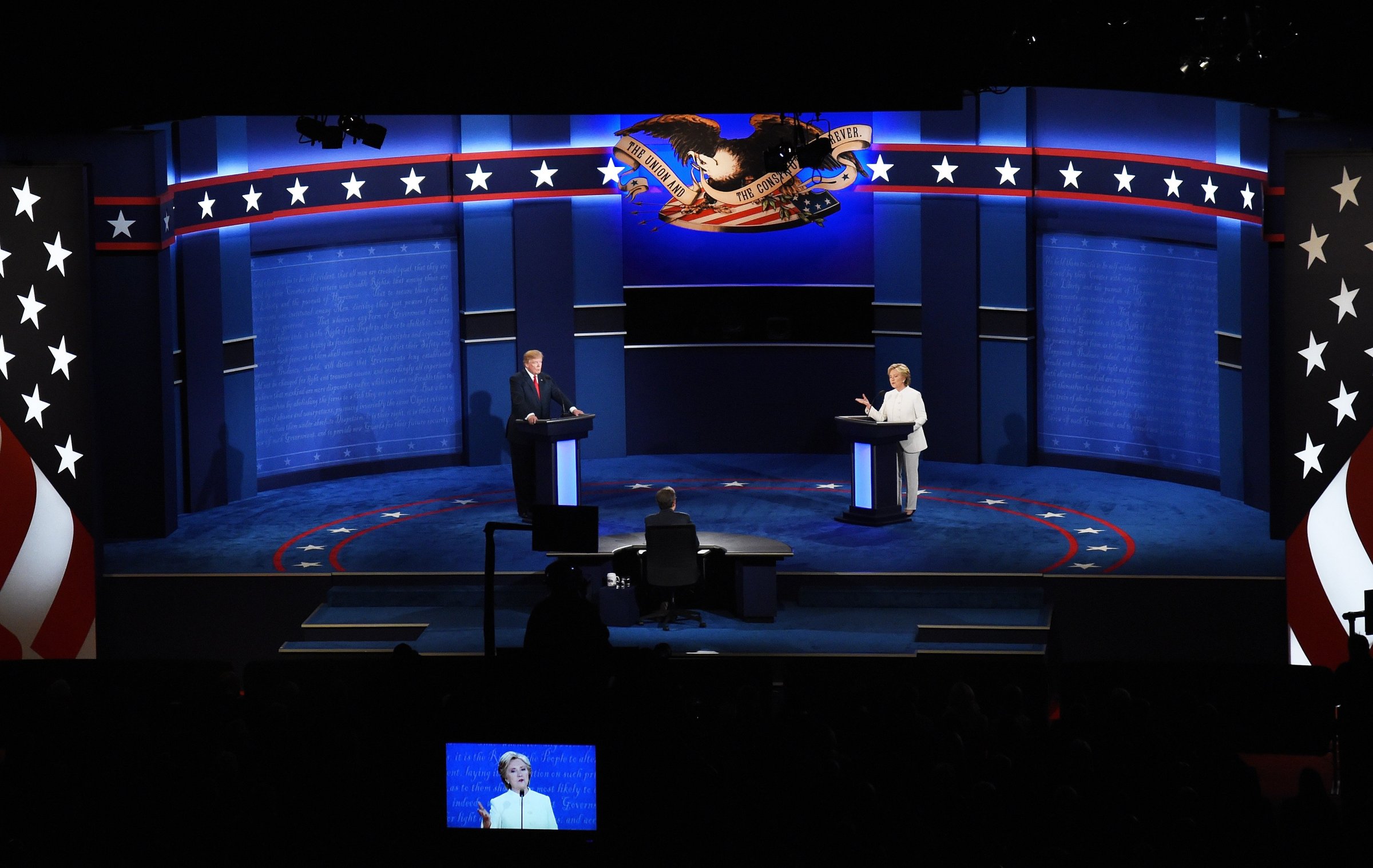
The third and final presidential debate of 2016, on Wednesday night, contained no shortage of surprising moments, from Republican nominee Donald Trump’s refusal to commit to accepting the results of the election to his calling opponent and Democratic nominee Hillary Clinton a “nasty woman.” One now-unsurprising moment was also, until recently, unprecedented: the lack of a handshake at either the beginning or the end of the event, which did not go unnoticed online.
After surveying footage of past presidential debates on YouTube, the Miami Herald‘s “Naked Politics” blog found “an unbroken streak of handshakes dating all the way back to the first time Gerald Ford faced Jimmy Carter in 1976″—the year that established debates as a regular event—and concluded that the Oct. 19 debate was the first time presidential candidates did not shake hands during a debate.
There have been at least two especially memorable handshakes since the first televised presidential debates in 1960.
During the Sept. 25, 1988, debate, some viewers thought the 6-ft. 2-in. George H.W. Bush held his handshake with 5-ft. 8-in. Massachusetts Governor Michael Dukakis for longer than necessary, as a power play to emphasize the height difference between the two. Undecided voters watching the debate with a reporter remarked “[Dukakis is] shorter than I thought” and “I’m surprised he didn’t bring along his RubberMaid step-ladder.” It also inspired an Saturday Night Live sketch in which Dana Carvey as Bush gives Jon Lovitz (Dukakis) a pat on the head.
Get your history fix in one place: sign up for the weekly TIME History newsletter
Another noteworthy moment came in 1980, when Ronald Reagan went up to Jimmy Carter’s podium to shake his hand at the Oct. 28 debate, when the incumbent Carter did not seem to be expecting it. “Carter seemed shocked by it,” Kathleen Hall Jamieson, director of the Annenberg Public Policy Center at the University of Pennsylvania, tells TIME. “He looked like he thought he was going to be knifed. It was a first move to create an image that was carried through the debate of Reagan as a genial, nonthreatening individual. The entire Carter strategy was to create a sense of risk and associate it with Reagan, but Reagan just genially extended his hand, and his whole demeanor was one that was reassuring. He didn’t reinforce the image Carter portrayed in ads, that if he becomes president, he’ll take us into war, destroy social programs — nothing in Reagan’s demeanor encapsulated that.”
The handshake, as a greeting, is thought to have been evolved to indicate willingness to start an exchange peaceably. “Historically, the open hand shows that you’re not carrying a weapon,” Jamieson points out. Not to mention “it signals a capacity for dialogue.”
Similarly, Richard M. Perloff, a professor of communication and political science at Cleveland State University, views the gesture as adding “gentility to politics,” noting that it also “symbolizes the sense of common purpose and shared mission that unifies parties.” That means, he says, that the lack of a handshake could indicate to viewers that “the divisions between parties are not bridgeable.”
Mitchell S. McKinney, professor of communication at the University of Missouri who served as a consultant to the Commission on Presidential Debates, says the gesture “telegraphs that we have a civil process,” and that people expect “certain things in terms of the level of decorum and a civil demeanor among our leaders.”
Or to put it even more simply, “The fact we’re noticing points out a break in protocol.”
More Must-Reads from TIME
- Donald Trump Is TIME's 2024 Person of the Year
- Why We Chose Trump as Person of the Year
- Is Intermittent Fasting Good or Bad for You?
- The 100 Must-Read Books of 2024
- The 20 Best Christmas TV Episodes
- Column: If Optimism Feels Ridiculous Now, Try Hope
- The Future of Climate Action Is Trade Policy
- Merle Bombardieri Is Helping People Make the Baby Decision
Write to Olivia B. Waxman at olivia.waxman@time.com